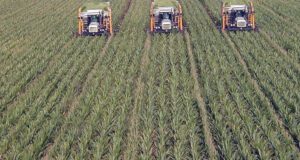
The China-Pakistan flax research and innovation hub was officially established on May 23 by the signing of a memorandum of understanding between the Gansu Academy of Agricultural Sciences and the Sindh Agriculture University of Tandojam, Pakistan.
The establishment of a base for the promotion and display of foreign intellectual achievements in flax breeding and stress resistance will begin in September 2020 in Lanzhou, the capital of Gansu Province. Dr. Ma Zhongming, President of the GAAS, and Prof. Dr. Fateh Mohammad Maree, Vice Chancellor of the Sindh Agriculture University of Tandojam, signed the MoU via the online link.
Both parties agreed to promote the transfer of a number of contemporary agricultural technologies from GAAS to SAU, including novel fruit germplasm resource cultivation techniques in cold and arid regions, flax cultivation and molecular breeding, forage sorghum cultivation and feeding technique, breeding and release of new cultivars of cotton, rape, flax, small miscellaneous grains, etc. in cold and arid regions, as well as education and training of agricultural personnel.
More specifically, GAAS and SAU will coordinate joint research initiatives, conferences, and training sessions, as well as faculty and graduate students (Master’s and Ph.D. candidates) exchanging scholarship offers. Additionally, the exchange of periodicals and academic materials is crucial.
“The Longya series of our new flax varieties were all chosen taking into account the dry and sparse rainfall conditions in Northwest China. In the planting experiments, the yield is typically over 10% higher than that of the native varieties, and the disease and insect pest resistance is better. Longya Nos. 11, 14, and 15 have so far been tentatively planted in Pakistan. According to Zhao Wei, a Researcher at the Crop Research Institute of GAAS, if everything goes according to plan, the series should be able to exert a good effect on drought resistance and increase yield under the climate conditions of Pakistan.
According to the MoU, the parties concur to establish a hub for flax research and innovation between the two nations, which will concentrate on high-yield and high-quality composite crops and work together on variety selection research, demonstrations, and promotion, cultivation technology optimization, plant protection, and agricultural mechanization.
Pakistan produces only 692 kg of flaxseed on average per hectare due to poor soil fertility, careless fertilizer use, a dearth of high-yield hybrid varieties, and outdated farming techniques. Given the value of edible oil and Pakistan’s low yield of oil crops, it is crucial to choose and cultivate flax varieties suited to the country’s climate and soil conditions as soon as possible.
In addition to flax cultivation, Researcher Zhao said, “Our value-added products, such as -linolenic acid capsules, eye care solution, as well as technical achievements, such as flax seeds used as livestock feed to increase the content of -linolenic acid in milk and meat, can share the experience with Pakistani counterparts to develop more products suitable for the local market.” Next, we hope to conduct more discussions on the development of stress-resistant flax germplasm resources and the initial choice of new varieties.
Read more: Dr. Aafia Siddiqui Meets Sister, Dr. Fauzia Siddiqui, After 20 Years







